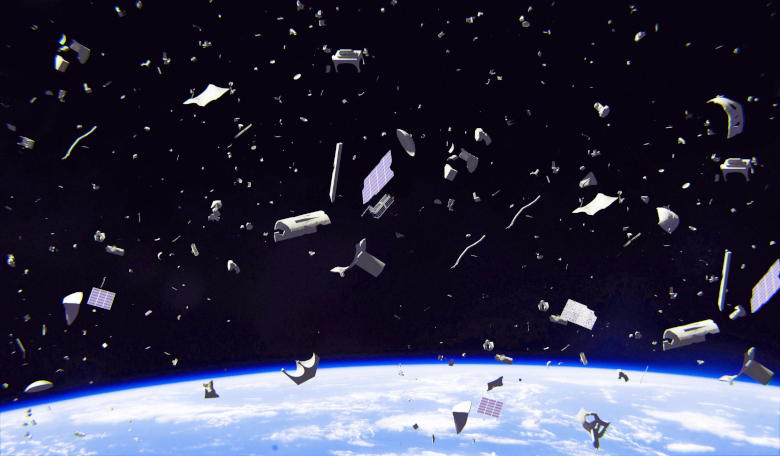G7 leaders from Canada, France, Germany, Italy, Japan, the USA, the UK and the EU pledged to take action to tackle the growing hazard of space debris as Earth orbits becomes increasingly crowded and dangerous.
In a statement issued at the end of the G7 summit, hosted in Cornwall at the weekend by the UK, nations pledged support for “the safe and sustainable use of space to support humanity’s ambitions now and in the future”.
The announcement was welcomed by Clive Simpson, Editor-in-Chief of ROOM Space Journal of Asgardia, which regularly champions issues around space sustainability.
Writing in the just published Summer 2021 issue of ROOM, he calls for global space companies and national agencies to take more responsibility, and suggests the space industry urgently needs stringent sustainability guidelines.
“As global populations grapple with the daily effects of climate change and pollution, the lessons of how we have mismanaged the environment and its resources are plain to see. The same is true for space, even if the outcomes of our inactions today may only become apparent in the future,” he says.
“While space sustainability has been a topic of discussion among academics and technologists for decades, the importance of protecting Earth's orbital environment and the expanding sphere of our new domain has never been more relevant.”
Simpson says that, in the absence of robust, internationally agreed and long-term sustainability laws and guidelines, it is doubtful that commercial space companies - and some state players - can be relied on to police themselves in the space realm.
“The questions surrounding space debris and the threat it poses become more urgent with every launch and, at present, the solutions on any level are far from certain. Now is the time to make sustainability a priority,” he adds.
One of the biggest global challenges facing the growing space sector is orbital congestion and space debris - with a currently estimated 900,000 pieces of space debris, some of which could stay in orbit for hundreds of years and present a real danger to the rapidly increasing number of new satellites being launched every year.
In a joint statement the G7 nations recognised the growing hazard of space debris and increasing congestion in Earth orbit:
As the orbit of our planet is a fragile and valuable environment that is becoming increasingly crowded, which all nations must act together to safeguard, we agree to strengthen our efforts to ensure the sustainable use of space for the benefit and in the interests of all countries.
- We welcome the United Nation’s Long Term Sustainability Guidelines and call on others to join us in implementing these guidelines.
- We welcome all efforts, public and commercial, in debris removal and on-orbit servicing activities and undertake to encourage further institutional or industrial research and development of these services.
- We recognise the importance of developing common standards, best practices and guidelines related to sustainable space operations alongside the need for a collaborative approach for space traffic management and co-ordination.
- We call on all nations to work together, through groups like the United Nations Committee on the Peaceful Uses of Outer Space, the International Organization for Standardization and the Inter-Agency Space Debris Coordination Committee, to preserve the space environment for future generations.
The G7 announcement is viewed as a significant milestone in recognising the need to develop common standards on sustainable space operations, and to collaborate on space traffic management and coordination.
Simonetta Di Pippo, Director of the UN Office for Outer Space Affairs, said: “There is an urgent need to stabilise global space operations. We must future-proof activities now to deliver a safe, secure and sustainable space environment for tomorrow.
“I welcome this clear commitment by G7 leaders to put space sustainability at the heart of the political agenda. Only through such leadership, with all nations working together, will we preserve the space environment for future generations.”
Mert Evirgen, of Northern Space Security, also advocates the need for legally binding guidelines in his article Collision avoidance - time for agreement on space sustainability, which appears in the Summer 2021 issue of ROOM.
“It is now up to the international space community to show that it is serious about managing the space environment in a responsible and sustainable fashion. Adherence to the principles articulated within these guidelines would be a good place to start,” he says.
* * *
The Summer 2021 issue of ROOM is available now. It contains a wealth of high quality special reports and articles, including: China’s ascending commercial space sector (Blaine Curcio), Robotic systems for psychological support (Anastasia Stepanova), Autonomous robots in space (Saber Fallah & Tatiana Farcas), Collaboration and competition in lunar exploration (Natalia Larrea Brito & Charlotte Croison), Is NewSpace really so new? (Walter Peeters), The next ‘unthinkable’ – global disruption from a solar storm (Calogero Nicosia), Space research in embryology (Irena Ogneva) and A shared vision for space exploration (Gabriel Swiney).
For your own digital or print copy click here - subscription offers











